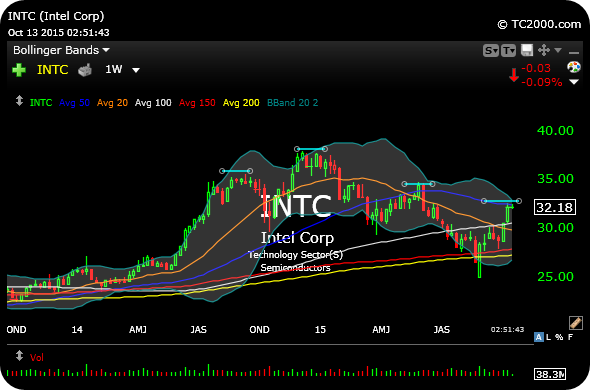13Oct3:03 pmEST
Intel the Bellwether
Intel is often referred to as a "bellwether stock," for semiconductors, technology, and perhaps the market at-large. To be sure, Intel has been around the block, now a mature, even old, tech firm amid a slew of young gunslingers in a changing landscape.
But with earnings after the bell tonight, INTC should give us insight if the semis in the SMH ETF are setting up as a short.
On the weekly chart, below, we can see Intel has rallied up to what should be a difficult price area, with the stock being in a corrective or downtrending pattern throughout 2015, heretofore. I am gauging the reaction closely to see if now is the time to pounce on the semis, as a group, after their oversold bounce this month.
As an aside, before financial media pundits throw around the word "bellwether" so much, they may very well take a look at the word's dark etymology:
The term “wether” originated in 9th century Old English, and referred to a castrated male sheep. By the 13th Century, the term “bellwether” had become synonymous with “wether,” and both referred to the poor, castrated male sheep. However, adding the prefix “bell” to “bellwether” denoted a specific role this neutered sheep played for both shepherds and his fellow sheep.
In order to track flocks of sheep, a bell was attached to the wether – giving rise to the term bellwether. The reason a bell was put on the wether, rather than other sheep, was because of his status as the flock eunuch. Bellwethers were docile and easily controlled. Because of the ease with which they could be controlled, they were used to lead the flock, and the sound of the bell around their necks kept the sheep’s owners apprised of their location.
Because of their emasculation, bellwethers were commonly used to lead their fellow sheep to slaughter. However, the bellwether never was killed: His skills, such as they were, proved too valuable to lose. Thus, early sheep slaughterhouses developed a “bellwether gate,” which was used to separate the useful-idiot bellwether sheep from the rest of the flock once he had led them into the slaughterhouse’s intake chute. The saved bellwether was introduced to a new flock and the process was repeated.
Like the word’s origin, the term has been neutered with time, and now refers only to leading indicators of group activity. Today, though, the word’s etymology remains apt. (source)

Johnson & Johnson and the Je... Stock Market Recap 10/13/15 ...













